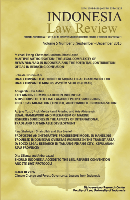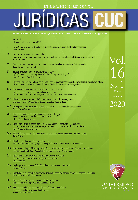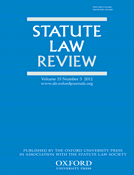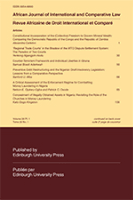
De Jure Law Journal
Scope & Guideline
Enriching Legal Dialogue Across Borders.
Introduction
Aims and Scopes
- Legal Analysis and Critique:
The journal emphasizes thorough legal analysis, providing critiques of existing laws and legal practices, especially in South African law, while also considering comparative perspectives from other jurisdictions. - Interdisciplinary Approaches:
There is a strong focus on interdisciplinary research, integrating insights from economics, sociology, and technology to address complex legal issues, particularly in areas like financial regulation, consumer protection, and human rights. - Focus on Contemporary Issues:
The journal addresses pressing contemporary legal issues, such as the implications of technology on law, the impact of global crises like COVID-19 on legal frameworks, and the evolving nature of rights and responsibilities in society. - Customary and Traditional Law:
A notable area of exploration is the interaction between customary law and statutory law, particularly in the context of succession, marriage, and property rights, reflecting the socio-cultural dimensions of law. - Consumer and Financial Protection:
The journal frequently publishes articles that analyze consumer rights, financial inclusion, and the regulatory landscape surrounding financial products and services, highlighting the need for robust consumer protection mechanisms.
Trending and Emerging
- Impact of Technology on Law:
There is a significant increase in articles discussing the legal implications of technology, particularly concerning artificial intelligence, data protection, and the regulation of cryptocurrencies, highlighting the need for adaptive legal frameworks in a digital age. - Post-Pandemic Legal Challenges:
A trend is emerging around the legal implications of the COVID-19 pandemic, with increasing publications addressing issues such as workplace regulations, health rights, and economic recovery, reflecting a rethinking of legal priorities in light of recent global events. - Consumer Protection and Financial Inclusion:
Recent publications emphasize the importance of consumer rights and financial inclusion, particularly in the context of mobile money and regulatory approaches, indicating a growing recognition of the need for effective consumer protection laws. - Human Rights and Social Justice:
There is an upward trend in discussions surrounding human rights, particularly in relation to marginalized communities, gender-based violence, and the rights of children, signaling a commitment to advancing social justice through legal scholarship. - Environmental Law and Liability:
The journal is increasingly focusing on environmental law, particularly concerning liability and conservation efforts, which reflects a broader global concern for sustainable practices and legal accountability in environmental issues.
Declining or Waning
- Traditional Corporate Law Topics:
There has been a noticeable decrease in articles purely focused on traditional corporate law issues, such as mergers and acquisitions, indicating a potential shift toward more contemporary and socially relevant corporate governance discussions. - Gender-Specific Legal Issues:
While gender-related legal issues remain important, the frequency of publications specifically addressing gender inequality in a standalone context appears to have waned, suggesting a possible integration of these discussions into broader human rights or social justice themes. - Historical Legal Analysis:
The journal has published fewer articles that focus on historical legal analyses or critiques of past laws and cases, which may suggest a growing preference for current and future-oriented legal scholarship. - Regional Legal Studies:
There is a decline in the focus on regional legal studies that examine laws within specific African countries, which may reflect a broader interest in more global or comparative legal perspectives.
Similar Journals

UNIVERSITY OF CHICAGO LAW REVIEW
Illuminating the Path of Legal ScholarshipUniversity of Chicago Law Review is a prestigious academic journal dedicated to advancing legal scholarship, published by the University of Chicago Law School. Renowned for its rigorous peer-review process and high editorial standards, this journal is recognized as a leader in the field of law, achieving a Q1 ranking in the 2023 category of Law and occupying a notable position within the Scopus rankings, specifically at #199 out of 1025 in the Social Sciences - Law category, placing it in the 80th percentile. The journal provides an essential platform for legal scholars, practitioners, and students to engage with cutting-edge research and theory across various legal disciplines, including constitutional law, criminal law, and comparative law. With a commitment to fostering critical discourse, the University of Chicago Law Review has been instrumental in shaping legal thought, making it a vital resource for anyone seeking to contribute to or understand the evolving landscape of legal studies. Although it does not currently offer open access, subscription options provide robust access to its extensive archive of scholarly articles since its inception.

OSGOODE HALL LAW JOURNAL
Pioneering Insights in Canadian JurisprudenceOsgoode Hall Law Journal, published by the renowned York University Osgoode Hall Law School, serves as a vital platform for legal scholarship in Canada. With a commitment to advancing knowledge in various fields of law, this journal publishes a broad range of articles, case studies, and critical analyses that address contemporary legal issues. While specific impact factors and indexing metrics such as H-Index and Scopus Ranks are not available, the journal's long-standing reputation and contributions to legal education make it an essential resource for researchers, legal practitioners, and students alike. Although it does not offer Open Access options, readers can access its content through libraries and subscriptions, ensuring the dissemination of high-quality legal research. The journal's aim is to foster robust dialogue among legal scholars and practitioners, thereby shaping the future of legal discourse in Canada and beyond.

Tydskrif Vir Die Suid-Afrikaanse Reg
Navigating the Evolving Landscape of LawTydskrif Vir Die Suid-Afrikaanse Reg, published by JUTA & CO LTD, is a vital scholarly journal contributing to the field of legal studies in South Africa. With an ISSN of 0257-7747 and E-ISSN of 1996-2207, this journal offers an academic platform for the publication of peer-reviewed articles addressing various facets of law, including case law analysis, legal theory, and regional legal practices. While currently positioned in the Q4 quartile of the 2023 Scopus rankings for Law, having a rank of #819 out of 1025, it provides an essential resource for research and discussion, aiming to elevate the quality of legal scholarship in the area. Even though it does not provide open-access options, its comprehensive coverage and commitment to advancing legal knowledge make it a significant asset for researchers, professionals, and students alike, particularly those interested in navigating the evolving landscape of South African law. The journal's content spans converged years from 2009 to 2024, ensuring a rich history of legal discourse and insight.

Indonesia Law Review
Exploring the Complexities of Indonesian LawIndonesia Law Review is a premier open-access academic journal dedicated to advancing knowledge in the fields of law and social sciences, with particular emphasis on the Indonesian legal landscape. Established by the Indonesian Law Review, this journal has made significant strides since becoming open access in 2014, ensuring that research is freely available to a global audience. Based in Depok, West Java, the journal seeks to foster scholarly discourse on legal issues pertinent to Indonesia, while also contributing to the broader field of education and social sciences. With its current Scopus rankings placing it within the top tiers of law and social sciences, including a Q3 categorization in law and a Q4 classification in education and miscellaneous social sciences, the **Indonesia Law Review** serves as a vital platform for researchers, professionals, and students to disseminate their findings and engage with contemporary legal dilemmas. The journal is committed to providing a robust forum for innovative legal scholarship and is an essential resource for anyone seeking to understand the complexities of law in Indonesia and beyond.

Revista de Derecho Civil
Exploring Contemporary Issues in Civil LawRevista de Derecho Civil is a distinguished academic journal dedicated to the field of civil law, published by NOTYREG HISPANIA in Spain. With an ISSN of 2341-2216 and E-ISSN of 2341-2216, it has established itself as an essential platform for scholarly discourse since gaining Open Access status in 2014, thereby ensuring a wider dissemination of knowledge and increased accessibility for researchers and practitioners alike. The journal has been recognized in the Q2 category in the field of Law for 2023, reflecting its contribution to the academic community and competitive standing within the discipline, evidenced by its Scopus rank of 683 out of 1025 in the Social Sciences and Law category. Covering a wide range of topics and converging from 2018 to 2024, Revista de Derecho Civil invites contributions from legal scholars globally, fostering an environment that promotes in-depth analysis, critical thought, and innovative research in civil law. As such, it holds an important place for students, researchers, and professionals aiming to engage with contemporary legal issues and doctrines.

Juridicas CUC
Championing Quality and Accessibility in Law ResearchJuridicas CUC, published by UNIV COSTA, is a distinguished open-access journal dedicated to the field of Law, prominent since 2011. With an ISSN of 1692-3030 and an E-ISSN of 2389-7716, this journal serves as a vital resource for researchers, professionals, and students in Colombia and beyond. It holds a commendable Q2 status in Law for 2023, and its Scopus ranking places it at #425 out of 1025 in Social Sciences _ Law, reflecting its commitment to high-quality scholarship, evident in its 58th percentile. The journal aims to foster academic dialogue by publishing innovative and impactful research, contributing to the advancement of legal studies in a global context. Located in Barranquilla, Colombia, Juridicas CUC is committed to enhancing accessibility to legal research, ensuring that scholars from various backgrounds can engage with contemporary legal issues effectively.

FORDHAM LAW REVIEW
Elevating Legal Discourse for Tomorrow's ChallengesFORDHAM LAW REVIEW is a prestigious legal journal published by Fordham University, School of Law, based in the United States. Established to disseminate cutting-edge legal scholarship, this journal has consistently achieved an impactful standing within the field, evidenced by its category ranking as Q1 in Law for 2023 and its Scopus ranking of #428 out of 1025 in the Social Sciences Law category, placing it in the 58th percentile. The journal welcomes submissions across diverse legal topics, fostering discourse that advances both legal theory and practice. Although it does not currently offer open access options, the Fordham Law Review serves as a vital resource for scholars, practitioners, and students seeking insights into contemporary legal challenges and developments. With its rich publication history dating back to the converged years of 1973 through 2024, the journal continues to be a cornerstone for rigorous legal analysis and a platform for influencing the evolution of law.

Statute Law Review
Unpacking the Implications of Statutory ApplicationStatute Law Review is an esteemed academic journal dedicated to the critical examination and analysis of statute law, publishing a broad range of scholarly articles that illuminate contemporary legal issues and enhance understanding within this specialized field. Published by Oxford University Press, the journal has been at the forefront of legal scholarship since its inception in 1980, and it continues to play a vital role in advancing legal discourse. With an impressive commitment to quality, Statute Law Review holds a Q3 quartile ranking in the law category and is recognized within the Scopus rankings as 694th out of 1025 in Social Sciences _ Law, indicating its relevance and contribution to the field. Although it is not an open-access journal, its rigorous peer-review process ensures that only the highest caliber of research is disseminated, making it an invaluable resource for researchers, practitioners, and students alike. As it converges into 2024, the journal remains a key platform for disseminating innovative ideas and fostering dialogue on the evolution and implications of statutory interpretation and application.

African Journal of International and Comparative Law
Advancing Legal Discourse Across AfricaAfrican Journal of International and Comparative Law is a distinguished publication that serves as a vital forum for scholarly discourse in the fields of international and comparative law, with a specific focus on legal issues pertinent to the African continent. Published by Edinburgh University Press, this journal boasts a respectable impact factor and finds its reputation bolstered by its strategic ranking within the Q3 category of law, according to Scopus metrics, where it occupies the 681st rank out of 1025 journals. Although it does not currently offer open access, the journal remains committed to fostering legal scholarship and providing critical insights that bridge the gap between theory and practice. The journal's coverage encompasses scholarly articles, case studies, and analyses of contemporary legal challenges from 2005 to 2024, making it an indispensable resource for researchers, practitioners, and students dedicated to advancing their understanding of international and comparative legal frameworks in the African context. The editorial team encourages submissions that contribute to the dialogue on legal reforms, human rights, and the impact of globalization on African law.

UNIVERSITY OF TORONTO LAW JOURNAL
Exploring Contemporary Legal ChallengesUNIVERSITY OF TORONTO LAW JOURNAL, published by University of Toronto Press Inc, stands as a distinguished platform in the realm of legal scholarship, having served the academic community since its inception. With an ISSN of 0042-0220 and an E-ISSN of 1710-1174, this quarterly journal is not only recognized for its rigorous peer-review process but also boasts an impressive Q2 rank in Law and a Q3 rank in Sociology and Political Science as per the 2023 category quartiles. The journal aims to foster advanced knowledge and discourse on various legal issues, thereby appealing to researchers, professionals, and students alike who are eager to engage with contemporary legal debates. It is noteworthy that the journal currently does not offer open access, ensuring the integrity and quality of its publications for a subscribed audience. Published in Canada and available for a wide readership, the UNIVERSITY OF TORONTO LAW JOURNAL continues to be a pivotal source for critical analyses and fresh insights in the fields of law and social sciences, contributing significantly to the understanding and evolution of legal frameworks.